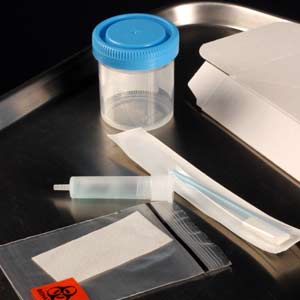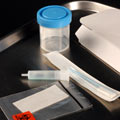Description of the test
A fecal occult blood test (FOBT) checks stool (feces) for blood. Occult blood means that blood is "hidden" in the stool and therefore is not necessarily visible.
Blood in the stool may indicate various conditions including inflammatory bowel disease (IBD), ulcers, polyps, hemorrhoids, or colon (colorectal) cancer.
How often should the test be performed?
The frequency of this test is recommended by your doctor. Testing is recommended at least every 2 years for people aged 50 to 74 who do not have a family history of colorectal cancer.
More frequent testing or testing at an earlier age may be recommended if you are at an increased risk of colorectal cancer (e.g., if you have a family history of colon cancer).
Why is this test performed?
Doctors often suggest this test to screen for colorectal cancer for people aged 50 to 74. The test is also occasionally used to help diagnose other problems in the digestive tract (e.g., ulcers, polyps). The test may also be used to investigate possible causes of anemia.
Are there any risks and precautions?
There are very few health risks for this test. However, dealing with stool may be a difficult experience for some people. Try to follow instructions closely and do things slowly to avoid problems.
Wash your hands before and after collecting the sample.
What happens during the test?
There are two types of tests available to check for blood in the stool: the guaiac fecal occult blood test (gFOBT) and the fecal immunochemical test (FIT or iFOBT).
The gFOBT uses guaiac to detect heme (part of the blood protein hemoglobin) in the stool. The test involves collecting three samples at home over a period of several days. A sample of stool is smeared on a card provided with the test kit. After obtaining the stool samples, you will mail the samples to a laboratory for analysis.
The FIT or iFOBT uses antibodies to find human hemoglobin in stool. The FIT is more accurate than gFOBT and usually only requires one stool sample. Your doctor may recommend a second test if your first test is negative, just to be sure.
To help ensure accurate results, follow the instructions that are provided to you with the test.
How should I prepare for this test?
If you are using a gFOBT, your doctor may recommend that you avoid certain foods and medications for 2 to 3 days before the test because they may affect the test results. Some of these include:
- red meat
- horseradish
- broccoli
- cabbage
- carrots
- turnips
- grapefruit
- vitamin C supplements and citrus fruits
- nonsteroidal anti-inflammatory drugs (NSAIDs), e.g., ibuprofen, naproxen
Follow the instructions provided to you. These restrictions are not needed for an iFOBT.
Tell your doctor or prescriber about all prescription, over-the-counter (non-prescription), and herbal medications that you are taking. Also tell them about any medication allergies and medical conditions that you may have.
Ask your doctor or pharmacist whether you need to stop taking any of your medications before the test.
What can I expect after the test?
Wash your hands thoroughly with soap and water after collecting the samples.
Results
Stool samples are sent to the laboratory to be interpreted.
Positive results mean there is blood in your stool. A positive result requires further investigation with other tests such as a colonoscopy, a flexible sigmoidoscopy exam, or barium enema.
Even if you have had a positive result from the stool test, keep in mind that it is quite common to lose a small amount of blood from the digestive system, and further testing often shows normal results. Nevertheless, it is important to do further tests as there is an increased risk of having a serious condition such as inflammatory bowel disease or colorectal cancer.
Negative results mean there is no blood in your stool. However, your doctor may suggest that you have another FOBT to be sure there is no blood in your stool.
All material copyright MediResource Inc. 1996 – 2024. Terms and conditions of use. The contents herein are for informational purposes only. Always seek the advice of your physician or other qualified health provider with any questions you may have regarding a medical condition. Source: www.medbroadcast.com/procedure/getprocedure/Fecal-Occult-Blood-Test-or-Fecal-Immunochemical-Test



